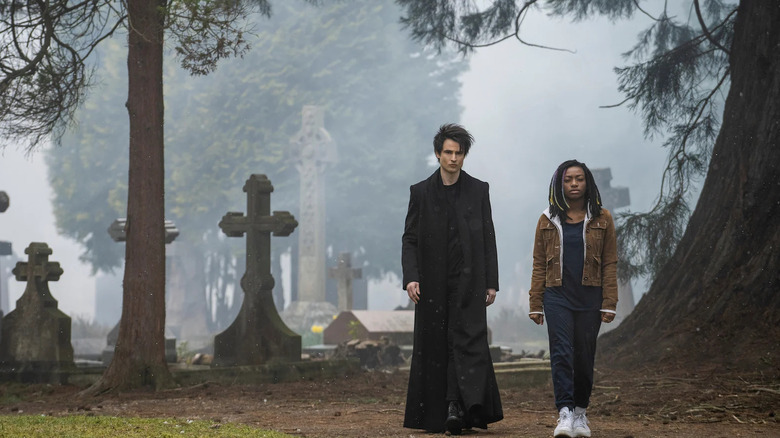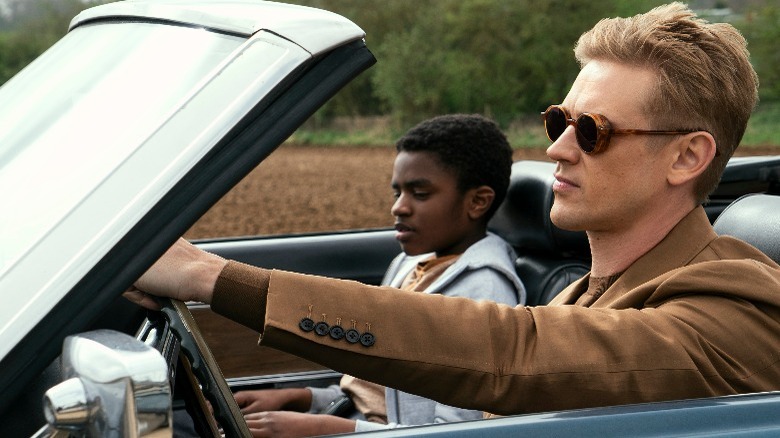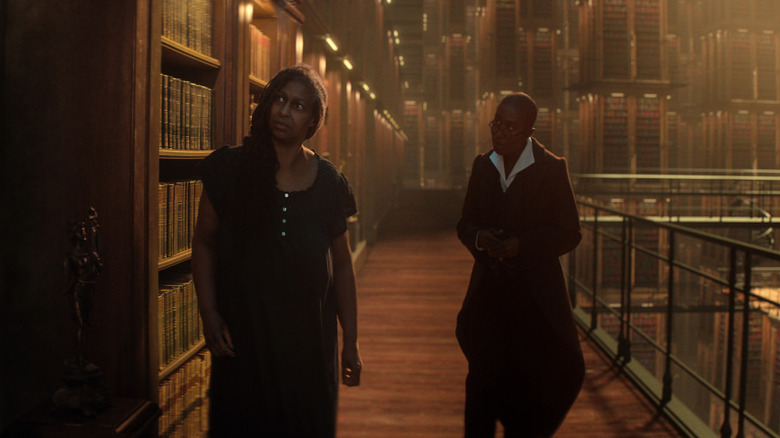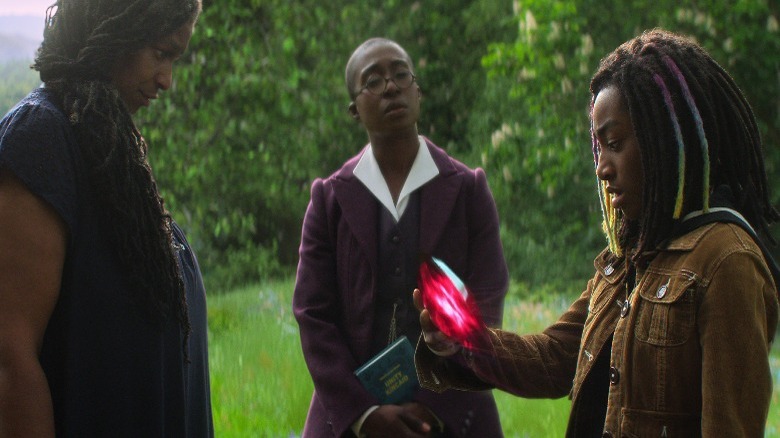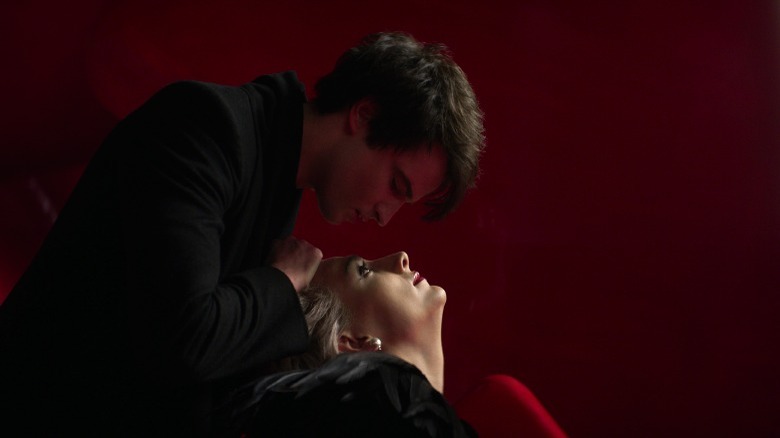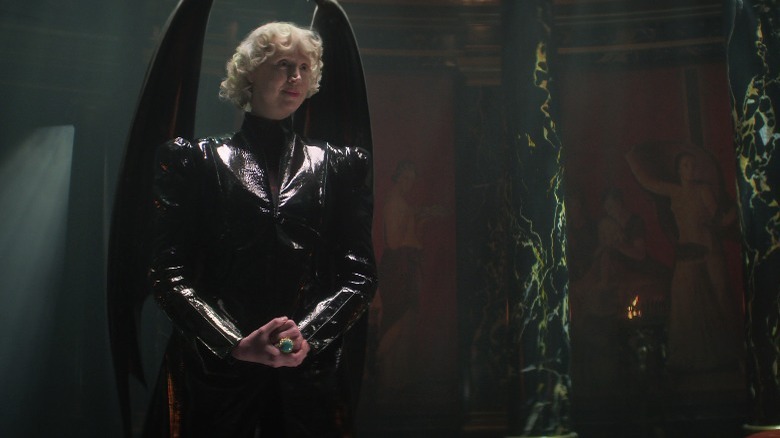The Sandman Season 1 Ending Explained: Dream A Little Dream Vortex
Spoilers follow for season 1 of "The Sandman."
"The Sandman" hit Netflix this week, and the series based on Neil Gaiman's beloved comics has been years in the making. The final product is a dream realized — an ambitious, jam-packed 10 episodes that cover the first two volumes of the author's fantasy series. After early episodes saw Dream (Tom Sturridge) break free of imprisonment and reclaim both his lost artifacts and his power to shape reality and the dreaming world, the end of the season introduced Rose (Vanesu Samunyai) and Jed (Eddie Karanja). The two resilient and clever siblings have a strange connection to Dream, especially Rose, who seems to have gained the power to control dreaming.
The season finale begins where the penultimate episode left off, with Jed and Rose cornered by the walking nightmare the Corinthian (Boyd Holbrook) at a cereal convention that turns out to be for serial killers. Rose has been accidentally messing with peoples' dreams in a big way, breaking down the barriers between reality and dreams with a power that makes her what the Endless and their ilk call a "dream vortex."
The cereal convention keynote
Corinthian makes a deal with Rose, revealing his own nefarious plan along the way. He claims that Morpheus is waiting until she falls asleep to kill her because she's destabilizing the dream world. He wants to keep her from his clutches, because if she continues on her current trajectory, Dream will lose power and Corinthian can be free to do as he wishes. He asks Rose to stay in the hotel room, and after he leaves, she and Jed apparently fall asleep.
Corinthian's plan doesn't pan out, though. After he gives a keynote address to the assembled killers, calling them truth-seekers and explorers while creepy intercut shots show viewers their nasty hobbies (yes, that's a guy sewing human skin), Morpheus confronts Corinthian in front of the crowd. The nightmare manages to stab the king of dreams, which shouldn't be possible, but apparently it is because Rose is "taking [his] place at the center of the dreaming." She's also accidentally makes everyone dream the same dream, one Corinthian inspired, that's all about violence and killing.
Then, in a neat but somewhat anticlimactic moment, Dream simply uncreates Corinthian, turning him into a pile of dust with a little tiny skull atop it. It turns out, he still has some power. "Next time I make you, you will not be so flawed and petty, little dream," he says, pocketing the skull. Meanwhile, Rose and Jed escape the hotel and head home while all around them, the killers influenced by Corinthian awaken to reality, cursed by Dream to feel the pain of the people they've hurt. The cereal convention was a short detour in the series overall, but this moment feels like it holds one of the keys to the series as a whole: empathy, and the danger of being blinded to it.
Another life
Speaking of which, Dream's own empathy is still clearly a work in progress: it turns out he really does plan to kill Rose. He meets her in a dreamscape where all her friends' dreams are colliding: Barbie (Lily Travers) and her dream buddy Martin Tenbones stumble upon Ken (Richard Fleeshman) in a compromising situation with a certain nurse, while Chantal (Daisy Badger) frantically reads a story aloud and Hal does a drag show with himself. Soon, Rose's dreaming power becomes unstable, and all of her friends get sucked up into a vortex, along with superhero Jed.
Once they're gone, Dream appears, and as usual, he's not particularly interested in seeming like the nice guy. He tells Rose she'll have to die to stop the dream vortex from ending the world, but luckily, this crisis is averted too. At the last minute, Unity Kincaid (Sandra James-Young), her great grandmother, appears with Lucienne (Vivienne Acheampong). She's just read a book detailing the history of herself, and learned something important: she was supposed to be the time vortex of this era. But when Unity fell into a deep sleep for decades due to the "sleepy sickness" brought on by Dream's imprisonment, the time vortex was transferred to her descendant — in this case, Rose.
A dream vortex bait and switch
Unity tells Rose to take the part of her that is the vortex and make it real, which Rose can do because it's a dream, duh. Rose turns her dream power into a deep pink-red heart gem that crackles with energy, which she hands to Unity. As the only sleepy sickness survivor, her great-grandmother has lived a long life, so she says she doesn't mind dying now.
This is one of those super-eventful dreams that just keeps going: Stephen Fry's character reappears, revealing himself as a wandering dream who belongs to Morpheus, but got off track trying to experience human life. His name's actually Fiddler's Green, and he's not a person, but a place. In a series full of imaginative revelations, this one is especially lovely. "It was a privilege being human with you," Fiddler's Green tells Rose, before exploding into a flurry of greenery.
Loose ends and revelations
In the end, Dream doesn't actually kill Unity. She puts the vortex energy in her own heart, and it seems to overwhelm her, killing her human body while she remains in the dreaming plane. She sticks around long enough to tell Morpheus about the person she had a child with, "a man with golden eyes." That sounds familiar: it turns out, Dream's mischievous sibling Desire (Mason Alexander Park) sired a child with Unity while she was under the spell of the sleepy sickness.
The lord of dreams goes to visit his sibling on their home turf, a wonderfully visceral lair that looks like the inside of a shiny plastic heart toy. Cat-like Desire doesn't deny Dream's accusation that Desire impregnated Unity to create a vortex on purpose, attempting to get Dream to kill a family member, "with all that entails."
This conflict ends on a cliffhanger: It's not clear why Desire set Dream up for failure a full century ago, but Dream warns them — along with Despair and Delirium, the latter of which we haven't met yet — to stay in their lanes, explaining that the Endless only exist because people believe in them. "I really got under your skin this time, didn't I?" Desire says. "Next time, I'll draw blood." Trickster-like entity Desire is a ton of fun to watch, so hopefully that's a promise.
Happy dreams?
Back on Earth, there are lots of loose ends to tie up, and "The Sandman" races to do so over the last few minutes. Lyta (Razane Jammal) has her dream baby, which turns out to be very real. Chantal and Zelda buy Hal's house, and he goes to New York to follow his dreams — though a blink-and-you'll-miss-it moment shows him back at the house with a new partner. Meanwhile, Rose submits a manuscript for a book about her life, and Jed is presumably back to doing normal kid stuff.
Morpheus retreats back to the dreaming world, where he uses his recovered powers to craft more dreams. One of them is Gault (Ann Ogbomo), the nightmare he punished for trying to help Jed through his own nightmare foster parent situation. It turns out, Morpheus isn't a total jerk after all: He's given Gault a beautiful pair of wings, and has decided to stick with the dream-making business for a while. He tells Lucienne to hold on to Corinthian's skull and run things for him for a bit while he works on his creations.
Lucifer's scheme
His peace doesn't seem designed to last, though. The finale ends with Lucifer (Gwendoline Christie) speaking to Lord Azazel, a brand new bad guy who, for lack of a better description, looks like a tear in the fabric of reality with a bunch of faces. Azazel tells Lucifer he's assembled the armies of hell in hopes of invading the dream world, and then later, the waking one as well. Lucifer is into this, and is struck by an idea: before the credits roll, she promises she's going to do something to "make god absolutely livid and bring Morpheus to his knees."
This is a thrilling ending, both because it means a season 2 renewal would bring fans more of Christie's delightfully devilish Lucifer, and because it seems just different enough from the source material to keep comic readers on their toes.
Part of the joy of watching "The Sandman" is that it doesn't follow normal narrative patterns, instead flitting between some plotlines and circling around others. With 75 issues of the Gaiman comics to pull from, it has a lot of ground to cover, and it does so in a dizzyingly entertaining way in this first season. The finale embodies this perfectly, as it tees up future installments while also giving audiences a good does of magic and wonder before they part.
